Business Law: Legal Analysis of Alpha's Contractual Duties to Piggy
VerifiedAdded on 2023/01/04
|8
|2049
|90
Report
AI Summary
This report analyzes a business law scenario involving Alpha and Piggy, focusing on a contract for the installation of coolers. The core issue revolves around Alpha's duties and potential breach of contract. The report examines the essential elements of a valid contract, including offer and acceptance, consideration, and intention to create legal relations. It applies these principles to the facts, highlighting the agreement between Alpha and Piggy for cooler installation, the specified timeframe, and Alpha's failure to meet the deadline. The analysis considers the legal implications of Alpha's actions, advising him to complete the work to avoid legal action from Piggy. The report concludes with a recommendation for Alpha to fulfill his obligations to prevent a breach of contract, referencing relevant case laws and legal concepts to support its arguments. The assignment provides a comprehensive overview of contract law principles and their application to a practical business scenario.
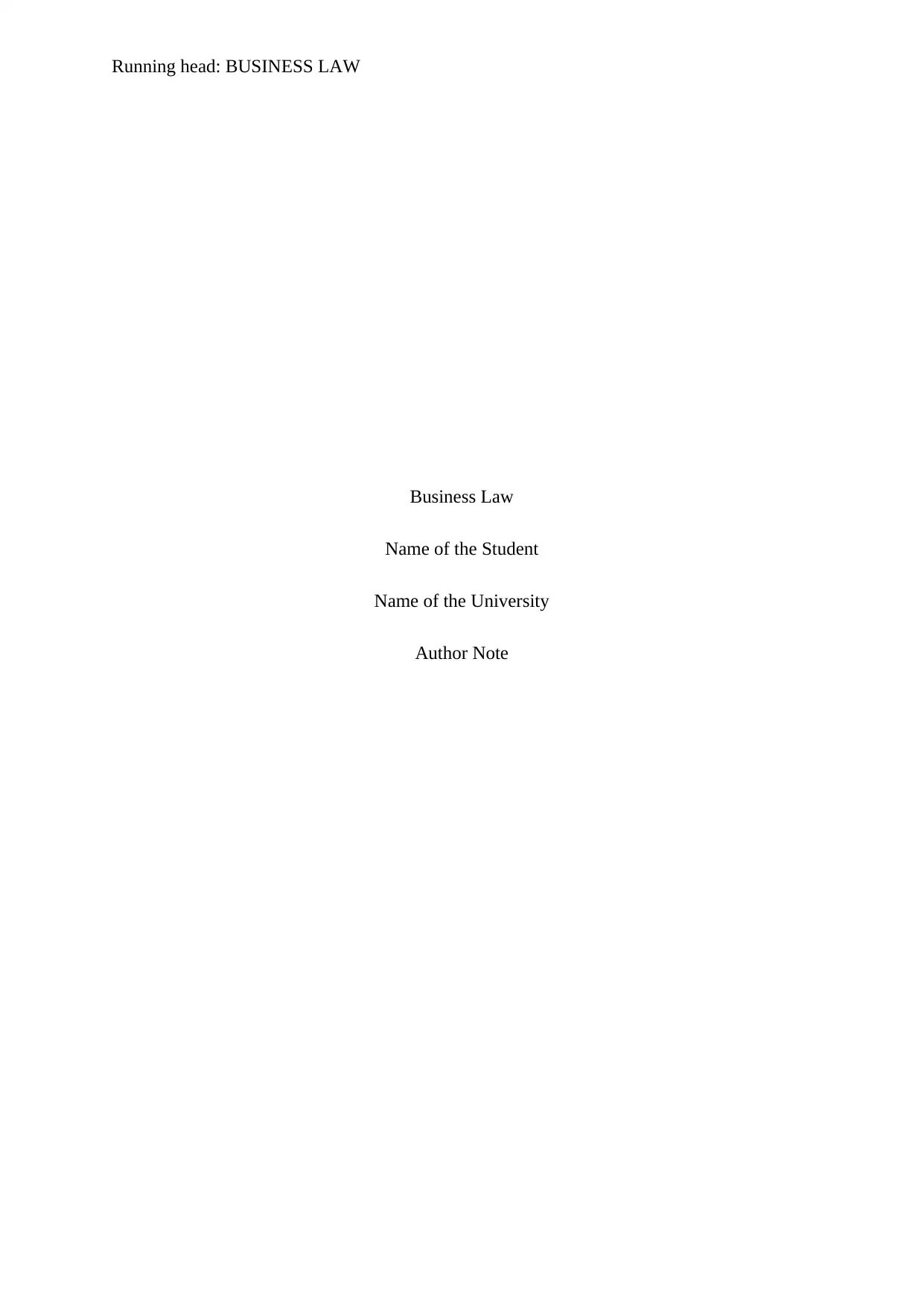
Running head: BUSINESS LAW
Business Law
Name of the Student
Name of the University
Author Note
Business Law
Name of the Student
Name of the University
Author Note
Paraphrase This Document
Need a fresh take? Get an instant paraphrase of this document with our AI Paraphraser
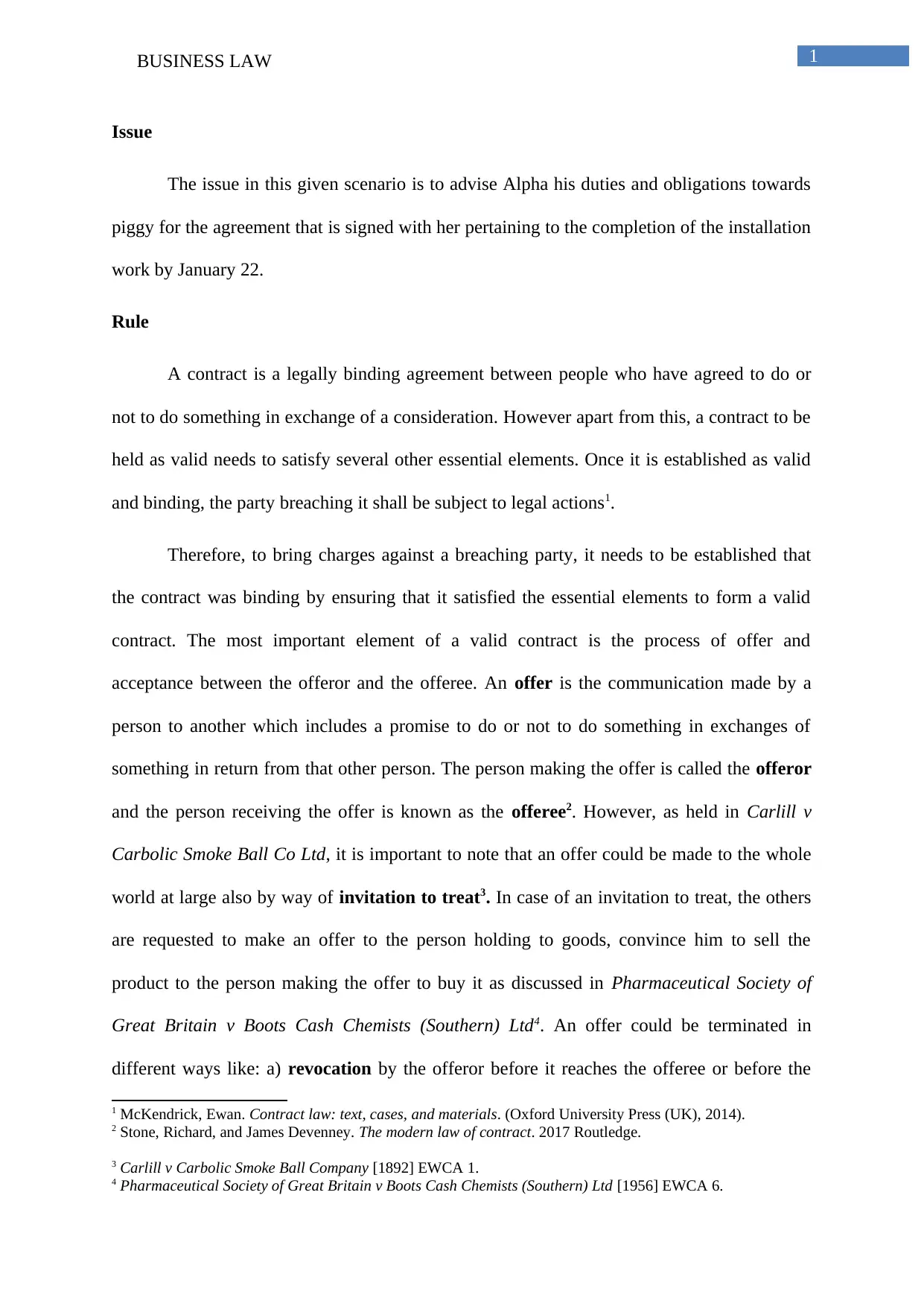
1BUSINESS LAW
Issue
The issue in this given scenario is to advise Alpha his duties and obligations towards
piggy for the agreement that is signed with her pertaining to the completion of the installation
work by January 22.
Rule
A contract is a legally binding agreement between people who have agreed to do or
not to do something in exchange of a consideration. However apart from this, a contract to be
held as valid needs to satisfy several other essential elements. Once it is established as valid
and binding, the party breaching it shall be subject to legal actions1.
Therefore, to bring charges against a breaching party, it needs to be established that
the contract was binding by ensuring that it satisfied the essential elements to form a valid
contract. The most important element of a valid contract is the process of offer and
acceptance between the offeror and the offeree. An offer is the communication made by a
person to another which includes a promise to do or not to do something in exchanges of
something in return from that other person. The person making the offer is called the offeror
and the person receiving the offer is known as the offeree2. However, as held in Carlill v
Carbolic Smoke Ball Co Ltd, it is important to note that an offer could be made to the whole
world at large also by way of invitation to treat3. In case of an invitation to treat, the others
are requested to make an offer to the person holding to goods, convince him to sell the
product to the person making the offer to buy it as discussed in Pharmaceutical Society of
Great Britain v Boots Cash Chemists (Southern) Ltd4. An offer could be terminated in
different ways like: a) revocation by the offeror before it reaches the offeree or before the
1 McKendrick, Ewan. Contract law: text, cases, and materials. (Oxford University Press (UK), 2014).
2 Stone, Richard, and James Devenney. The modern law of contract. 2017 Routledge.
3 Carlill v Carbolic Smoke Ball Company [1892] EWCA 1.
4 Pharmaceutical Society of Great Britain v Boots Cash Chemists (Southern) Ltd [1956] EWCA 6.
Issue
The issue in this given scenario is to advise Alpha his duties and obligations towards
piggy for the agreement that is signed with her pertaining to the completion of the installation
work by January 22.
Rule
A contract is a legally binding agreement between people who have agreed to do or
not to do something in exchange of a consideration. However apart from this, a contract to be
held as valid needs to satisfy several other essential elements. Once it is established as valid
and binding, the party breaching it shall be subject to legal actions1.
Therefore, to bring charges against a breaching party, it needs to be established that
the contract was binding by ensuring that it satisfied the essential elements to form a valid
contract. The most important element of a valid contract is the process of offer and
acceptance between the offeror and the offeree. An offer is the communication made by a
person to another which includes a promise to do or not to do something in exchanges of
something in return from that other person. The person making the offer is called the offeror
and the person receiving the offer is known as the offeree2. However, as held in Carlill v
Carbolic Smoke Ball Co Ltd, it is important to note that an offer could be made to the whole
world at large also by way of invitation to treat3. In case of an invitation to treat, the others
are requested to make an offer to the person holding to goods, convince him to sell the
product to the person making the offer to buy it as discussed in Pharmaceutical Society of
Great Britain v Boots Cash Chemists (Southern) Ltd4. An offer could be terminated in
different ways like: a) revocation by the offeror before it reaches the offeree or before the
1 McKendrick, Ewan. Contract law: text, cases, and materials. (Oxford University Press (UK), 2014).
2 Stone, Richard, and James Devenney. The modern law of contract. 2017 Routledge.
3 Carlill v Carbolic Smoke Ball Company [1892] EWCA 1.
4 Pharmaceutical Society of Great Britain v Boots Cash Chemists (Southern) Ltd [1956] EWCA 6.
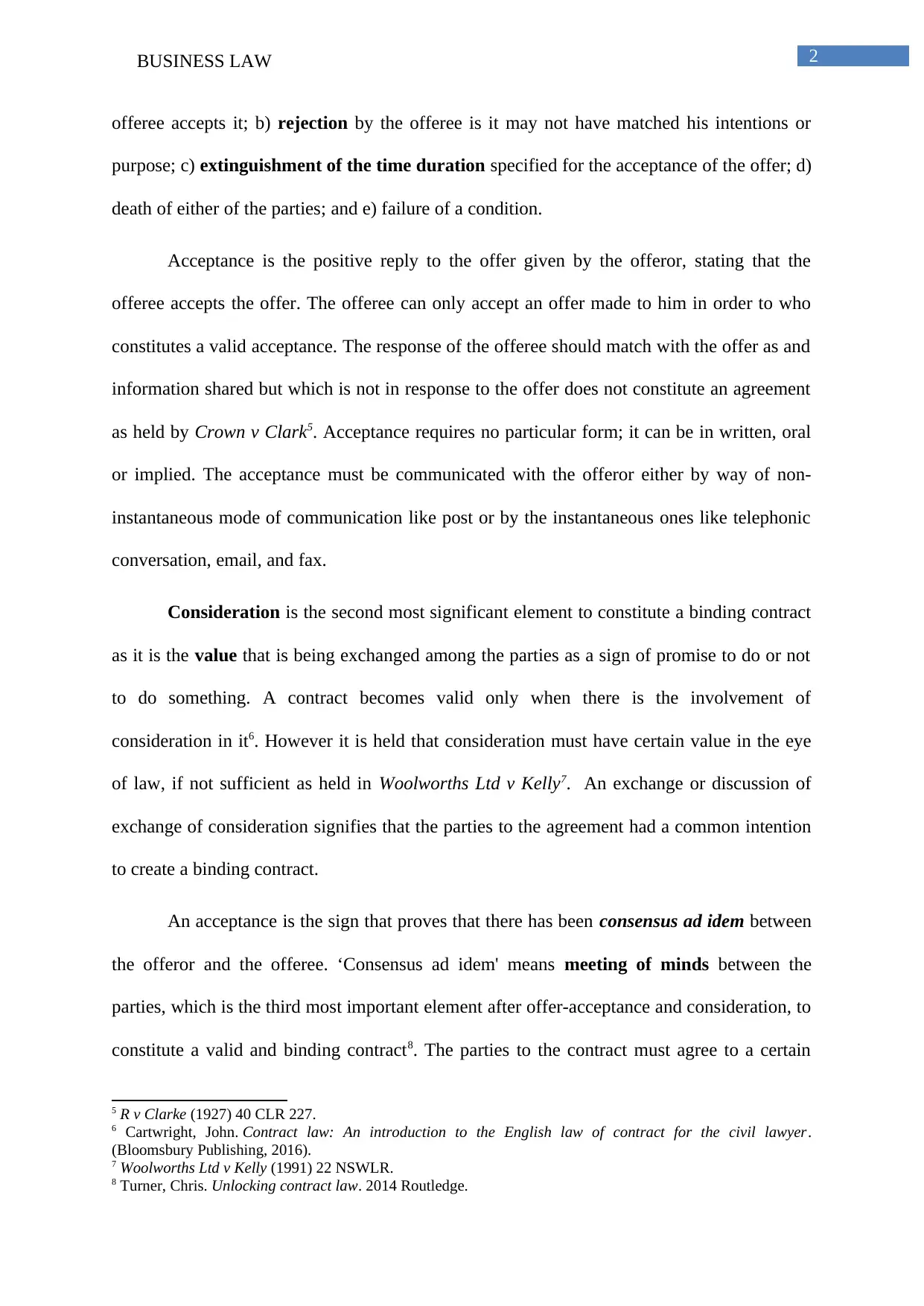
2BUSINESS LAW
offeree accepts it; b) rejection by the offeree is it may not have matched his intentions or
purpose; c) extinguishment of the time duration specified for the acceptance of the offer; d)
death of either of the parties; and e) failure of a condition.
Acceptance is the positive reply to the offer given by the offeror, stating that the
offeree accepts the offer. The offeree can only accept an offer made to him in order to who
constitutes a valid acceptance. The response of the offeree should match with the offer as and
information shared but which is not in response to the offer does not constitute an agreement
as held by Crown v Clark5. Acceptance requires no particular form; it can be in written, oral
or implied. The acceptance must be communicated with the offeror either by way of non-
instantaneous mode of communication like post or by the instantaneous ones like telephonic
conversation, email, and fax.
Consideration is the second most significant element to constitute a binding contract
as it is the value that is being exchanged among the parties as a sign of promise to do or not
to do something. A contract becomes valid only when there is the involvement of
consideration in it6. However it is held that consideration must have certain value in the eye
of law, if not sufficient as held in Woolworths Ltd v Kelly7. An exchange or discussion of
exchange of consideration signifies that the parties to the agreement had a common intention
to create a binding contract.
An acceptance is the sign that proves that there has been consensus ad idem between
the offeror and the offeree. ‘Consensus ad idem' means meeting of minds between the
parties, which is the third most important element after offer-acceptance and consideration, to
constitute a valid and binding contract8. The parties to the contract must agree to a certain
5 R v Clarke (1927) 40 CLR 227.
6 Cartwright, John. Contract law: An introduction to the English law of contract for the civil lawyer.
(Bloomsbury Publishing, 2016).
7 Woolworths Ltd v Kelly (1991) 22 NSWLR.
8 Turner, Chris. Unlocking contract law. 2014 Routledge.
offeree accepts it; b) rejection by the offeree is it may not have matched his intentions or
purpose; c) extinguishment of the time duration specified for the acceptance of the offer; d)
death of either of the parties; and e) failure of a condition.
Acceptance is the positive reply to the offer given by the offeror, stating that the
offeree accepts the offer. The offeree can only accept an offer made to him in order to who
constitutes a valid acceptance. The response of the offeree should match with the offer as and
information shared but which is not in response to the offer does not constitute an agreement
as held by Crown v Clark5. Acceptance requires no particular form; it can be in written, oral
or implied. The acceptance must be communicated with the offeror either by way of non-
instantaneous mode of communication like post or by the instantaneous ones like telephonic
conversation, email, and fax.
Consideration is the second most significant element to constitute a binding contract
as it is the value that is being exchanged among the parties as a sign of promise to do or not
to do something. A contract becomes valid only when there is the involvement of
consideration in it6. However it is held that consideration must have certain value in the eye
of law, if not sufficient as held in Woolworths Ltd v Kelly7. An exchange or discussion of
exchange of consideration signifies that the parties to the agreement had a common intention
to create a binding contract.
An acceptance is the sign that proves that there has been consensus ad idem between
the offeror and the offeree. ‘Consensus ad idem' means meeting of minds between the
parties, which is the third most important element after offer-acceptance and consideration, to
constitute a valid and binding contract8. The parties to the contract must agree to a certain
5 R v Clarke (1927) 40 CLR 227.
6 Cartwright, John. Contract law: An introduction to the English law of contract for the civil lawyer.
(Bloomsbury Publishing, 2016).
7 Woolworths Ltd v Kelly (1991) 22 NSWLR.
8 Turner, Chris. Unlocking contract law. 2014 Routledge.
⊘ This is a preview!⊘
Do you want full access?
Subscribe today to unlock all pages.

Trusted by 1+ million students worldwide
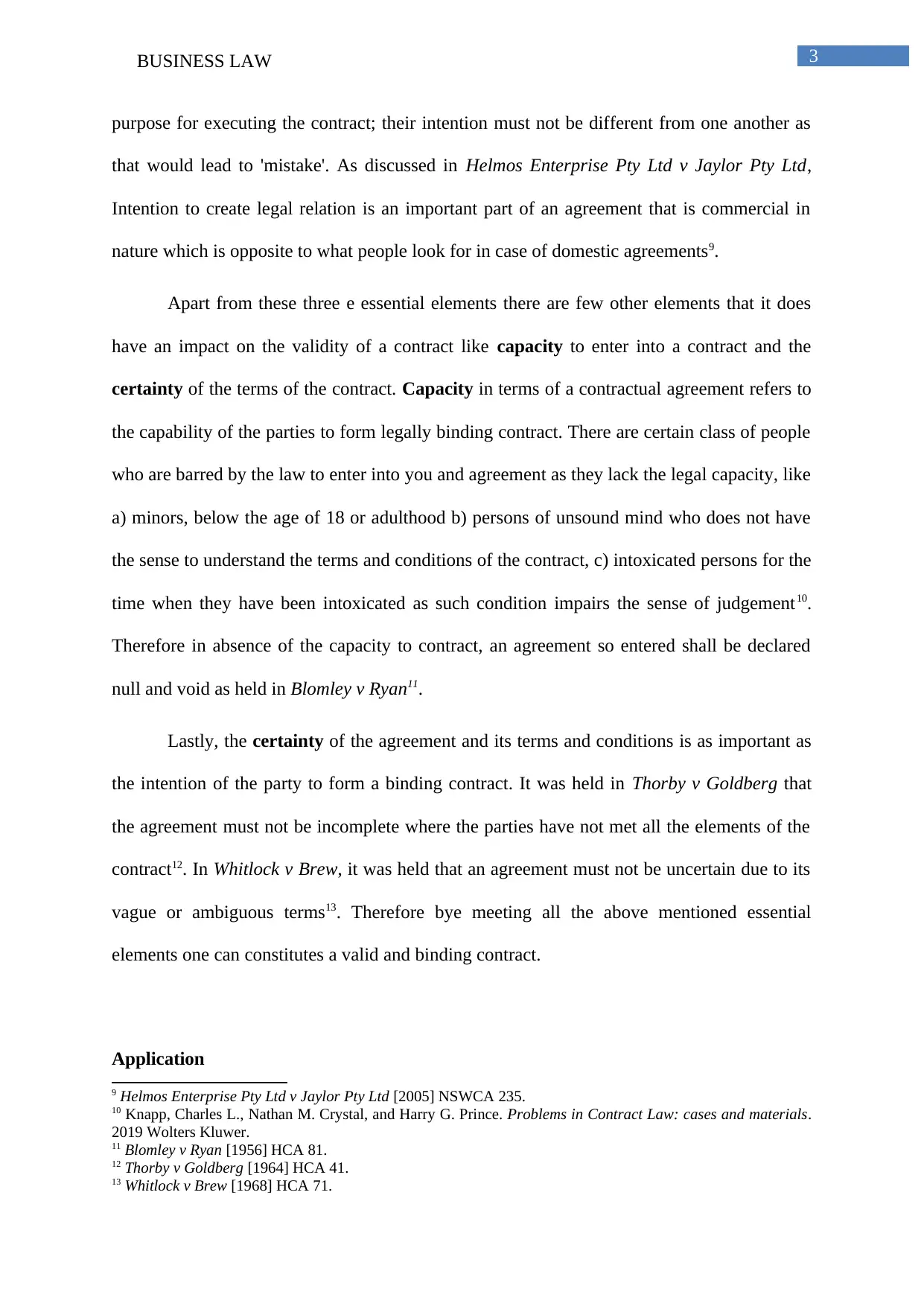
3BUSINESS LAW
purpose for executing the contract; their intention must not be different from one another as
that would lead to 'mistake'. As discussed in Helmos Enterprise Pty Ltd v Jaylor Pty Ltd,
Intention to create legal relation is an important part of an agreement that is commercial in
nature which is opposite to what people look for in case of domestic agreements9.
Apart from these three e essential elements there are few other elements that it does
have an impact on the validity of a contract like capacity to enter into a contract and the
certainty of the terms of the contract. Capacity in terms of a contractual agreement refers to
the capability of the parties to form legally binding contract. There are certain class of people
who are barred by the law to enter into you and agreement as they lack the legal capacity, like
a) minors, below the age of 18 or adulthood b) persons of unsound mind who does not have
the sense to understand the terms and conditions of the contract, c) intoxicated persons for the
time when they have been intoxicated as such condition impairs the sense of judgement10.
Therefore in absence of the capacity to contract, an agreement so entered shall be declared
null and void as held in Blomley v Ryan11.
Lastly, the certainty of the agreement and its terms and conditions is as important as
the intention of the party to form a binding contract. It was held in Thorby v Goldberg that
the agreement must not be incomplete where the parties have not met all the elements of the
contract12. In Whitlock v Brew, it was held that an agreement must not be uncertain due to its
vague or ambiguous terms13. Therefore bye meeting all the above mentioned essential
elements one can constitutes a valid and binding contract.
Application
9 Helmos Enterprise Pty Ltd v Jaylor Pty Ltd [2005] NSWCA 235.
10 Knapp, Charles L., Nathan M. Crystal, and Harry G. Prince. Problems in Contract Law: cases and materials.
2019 Wolters Kluwer.
11 Blomley v Ryan [1956] HCA 81.
12 Thorby v Goldberg [1964] HCA 41.
13 Whitlock v Brew [1968] HCA 71.
purpose for executing the contract; their intention must not be different from one another as
that would lead to 'mistake'. As discussed in Helmos Enterprise Pty Ltd v Jaylor Pty Ltd,
Intention to create legal relation is an important part of an agreement that is commercial in
nature which is opposite to what people look for in case of domestic agreements9.
Apart from these three e essential elements there are few other elements that it does
have an impact on the validity of a contract like capacity to enter into a contract and the
certainty of the terms of the contract. Capacity in terms of a contractual agreement refers to
the capability of the parties to form legally binding contract. There are certain class of people
who are barred by the law to enter into you and agreement as they lack the legal capacity, like
a) minors, below the age of 18 or adulthood b) persons of unsound mind who does not have
the sense to understand the terms and conditions of the contract, c) intoxicated persons for the
time when they have been intoxicated as such condition impairs the sense of judgement10.
Therefore in absence of the capacity to contract, an agreement so entered shall be declared
null and void as held in Blomley v Ryan11.
Lastly, the certainty of the agreement and its terms and conditions is as important as
the intention of the party to form a binding contract. It was held in Thorby v Goldberg that
the agreement must not be incomplete where the parties have not met all the elements of the
contract12. In Whitlock v Brew, it was held that an agreement must not be uncertain due to its
vague or ambiguous terms13. Therefore bye meeting all the above mentioned essential
elements one can constitutes a valid and binding contract.
Application
9 Helmos Enterprise Pty Ltd v Jaylor Pty Ltd [2005] NSWCA 235.
10 Knapp, Charles L., Nathan M. Crystal, and Harry G. Prince. Problems in Contract Law: cases and materials.
2019 Wolters Kluwer.
11 Blomley v Ryan [1956] HCA 81.
12 Thorby v Goldberg [1964] HCA 41.
13 Whitlock v Brew [1968] HCA 71.
Paraphrase This Document
Need a fresh take? Get an instant paraphrase of this document with our AI Paraphraser
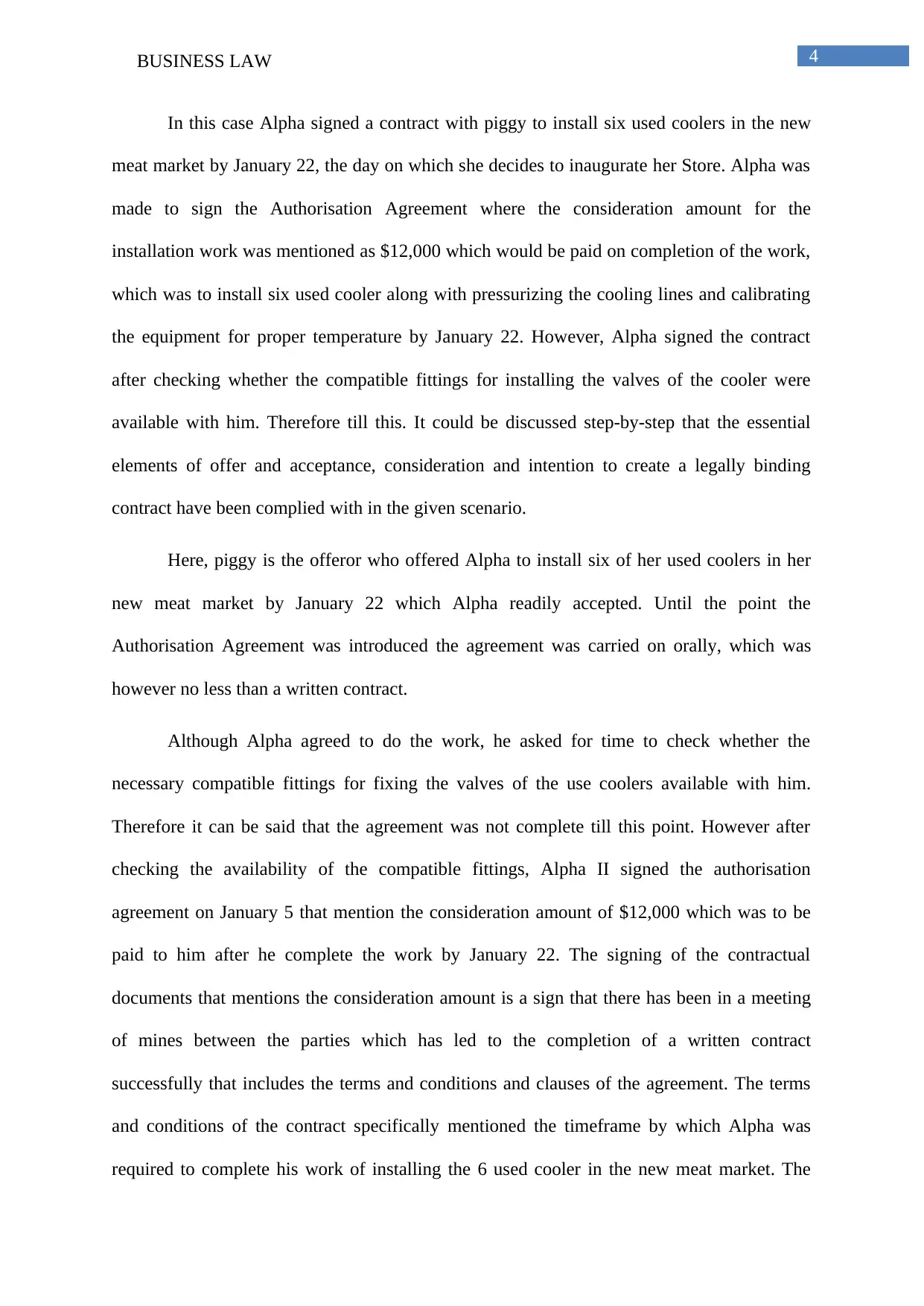
4BUSINESS LAW
In this case Alpha signed a contract with piggy to install six used coolers in the new
meat market by January 22, the day on which she decides to inaugurate her Store. Alpha was
made to sign the Authorisation Agreement where the consideration amount for the
installation work was mentioned as $12,000 which would be paid on completion of the work,
which was to install six used cooler along with pressurizing the cooling lines and calibrating
the equipment for proper temperature by January 22. However, Alpha signed the contract
after checking whether the compatible fittings for installing the valves of the cooler were
available with him. Therefore till this. It could be discussed step-by-step that the essential
elements of offer and acceptance, consideration and intention to create a legally binding
contract have been complied with in the given scenario.
Here, piggy is the offeror who offered Alpha to install six of her used coolers in her
new meat market by January 22 which Alpha readily accepted. Until the point the
Authorisation Agreement was introduced the agreement was carried on orally, which was
however no less than a written contract.
Although Alpha agreed to do the work, he asked for time to check whether the
necessary compatible fittings for fixing the valves of the use coolers available with him.
Therefore it can be said that the agreement was not complete till this point. However after
checking the availability of the compatible fittings, Alpha II signed the authorisation
agreement on January 5 that mention the consideration amount of $12,000 which was to be
paid to him after he complete the work by January 22. The signing of the contractual
documents that mentions the consideration amount is a sign that there has been in a meeting
of mines between the parties which has led to the completion of a written contract
successfully that includes the terms and conditions and clauses of the agreement. The terms
and conditions of the contract specifically mentioned the timeframe by which Alpha was
required to complete his work of installing the 6 used cooler in the new meat market. The
In this case Alpha signed a contract with piggy to install six used coolers in the new
meat market by January 22, the day on which she decides to inaugurate her Store. Alpha was
made to sign the Authorisation Agreement where the consideration amount for the
installation work was mentioned as $12,000 which would be paid on completion of the work,
which was to install six used cooler along with pressurizing the cooling lines and calibrating
the equipment for proper temperature by January 22. However, Alpha signed the contract
after checking whether the compatible fittings for installing the valves of the cooler were
available with him. Therefore till this. It could be discussed step-by-step that the essential
elements of offer and acceptance, consideration and intention to create a legally binding
contract have been complied with in the given scenario.
Here, piggy is the offeror who offered Alpha to install six of her used coolers in her
new meat market by January 22 which Alpha readily accepted. Until the point the
Authorisation Agreement was introduced the agreement was carried on orally, which was
however no less than a written contract.
Although Alpha agreed to do the work, he asked for time to check whether the
necessary compatible fittings for fixing the valves of the use coolers available with him.
Therefore it can be said that the agreement was not complete till this point. However after
checking the availability of the compatible fittings, Alpha II signed the authorisation
agreement on January 5 that mention the consideration amount of $12,000 which was to be
paid to him after he complete the work by January 22. The signing of the contractual
documents that mentions the consideration amount is a sign that there has been in a meeting
of mines between the parties which has led to the completion of a written contract
successfully that includes the terms and conditions and clauses of the agreement. The terms
and conditions of the contract specifically mentioned the timeframe by which Alpha was
required to complete his work of installing the 6 used cooler in the new meat market. The
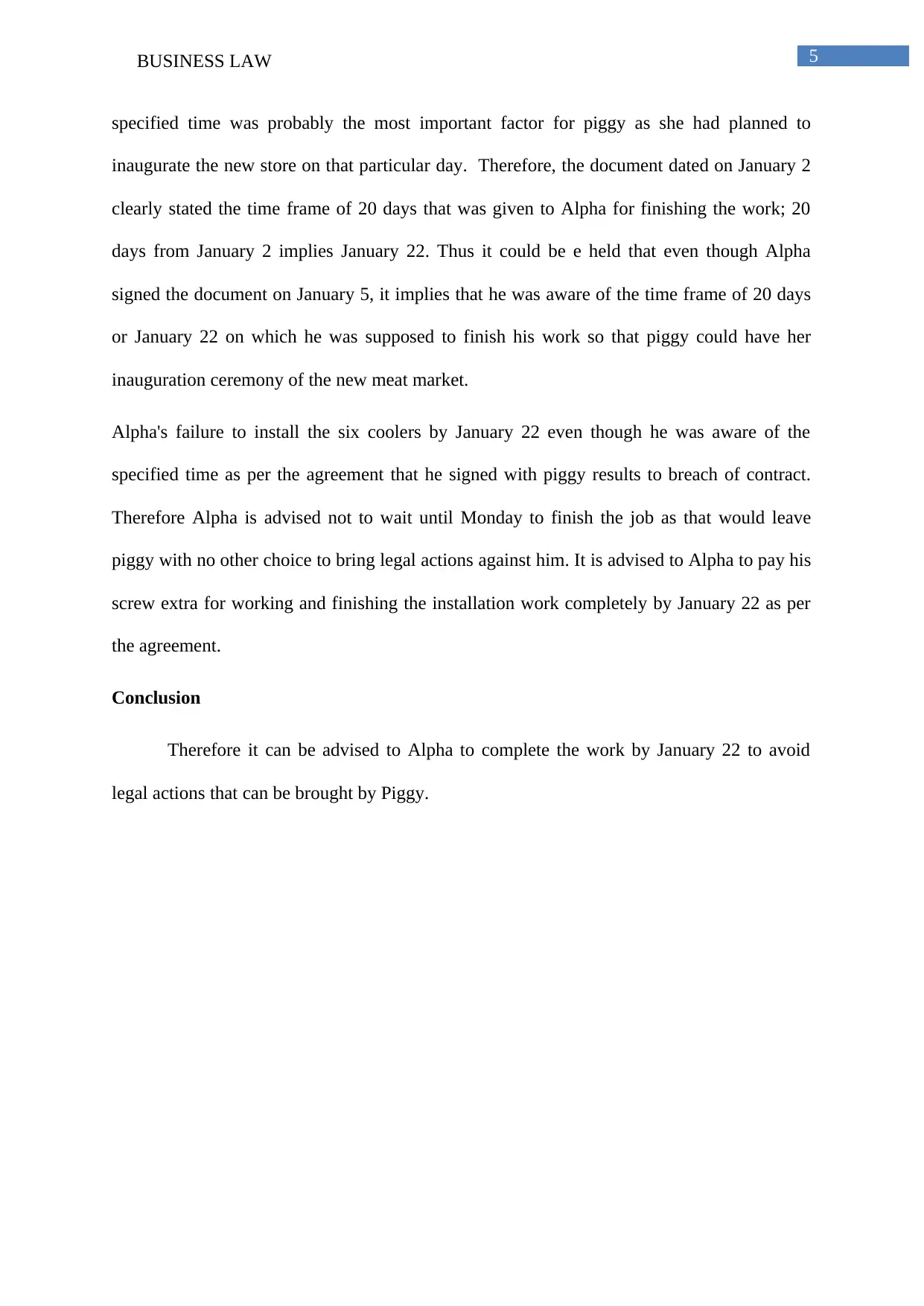
5BUSINESS LAW
specified time was probably the most important factor for piggy as she had planned to
inaugurate the new store on that particular day. Therefore, the document dated on January 2
clearly stated the time frame of 20 days that was given to Alpha for finishing the work; 20
days from January 2 implies January 22. Thus it could be e held that even though Alpha
signed the document on January 5, it implies that he was aware of the time frame of 20 days
or January 22 on which he was supposed to finish his work so that piggy could have her
inauguration ceremony of the new meat market.
Alpha's failure to install the six coolers by January 22 even though he was aware of the
specified time as per the agreement that he signed with piggy results to breach of contract.
Therefore Alpha is advised not to wait until Monday to finish the job as that would leave
piggy with no other choice to bring legal actions against him. It is advised to Alpha to pay his
screw extra for working and finishing the installation work completely by January 22 as per
the agreement.
Conclusion
Therefore it can be advised to Alpha to complete the work by January 22 to avoid
legal actions that can be brought by Piggy.
specified time was probably the most important factor for piggy as she had planned to
inaugurate the new store on that particular day. Therefore, the document dated on January 2
clearly stated the time frame of 20 days that was given to Alpha for finishing the work; 20
days from January 2 implies January 22. Thus it could be e held that even though Alpha
signed the document on January 5, it implies that he was aware of the time frame of 20 days
or January 22 on which he was supposed to finish his work so that piggy could have her
inauguration ceremony of the new meat market.
Alpha's failure to install the six coolers by January 22 even though he was aware of the
specified time as per the agreement that he signed with piggy results to breach of contract.
Therefore Alpha is advised not to wait until Monday to finish the job as that would leave
piggy with no other choice to bring legal actions against him. It is advised to Alpha to pay his
screw extra for working and finishing the installation work completely by January 22 as per
the agreement.
Conclusion
Therefore it can be advised to Alpha to complete the work by January 22 to avoid
legal actions that can be brought by Piggy.
⊘ This is a preview!⊘
Do you want full access?
Subscribe today to unlock all pages.

Trusted by 1+ million students worldwide
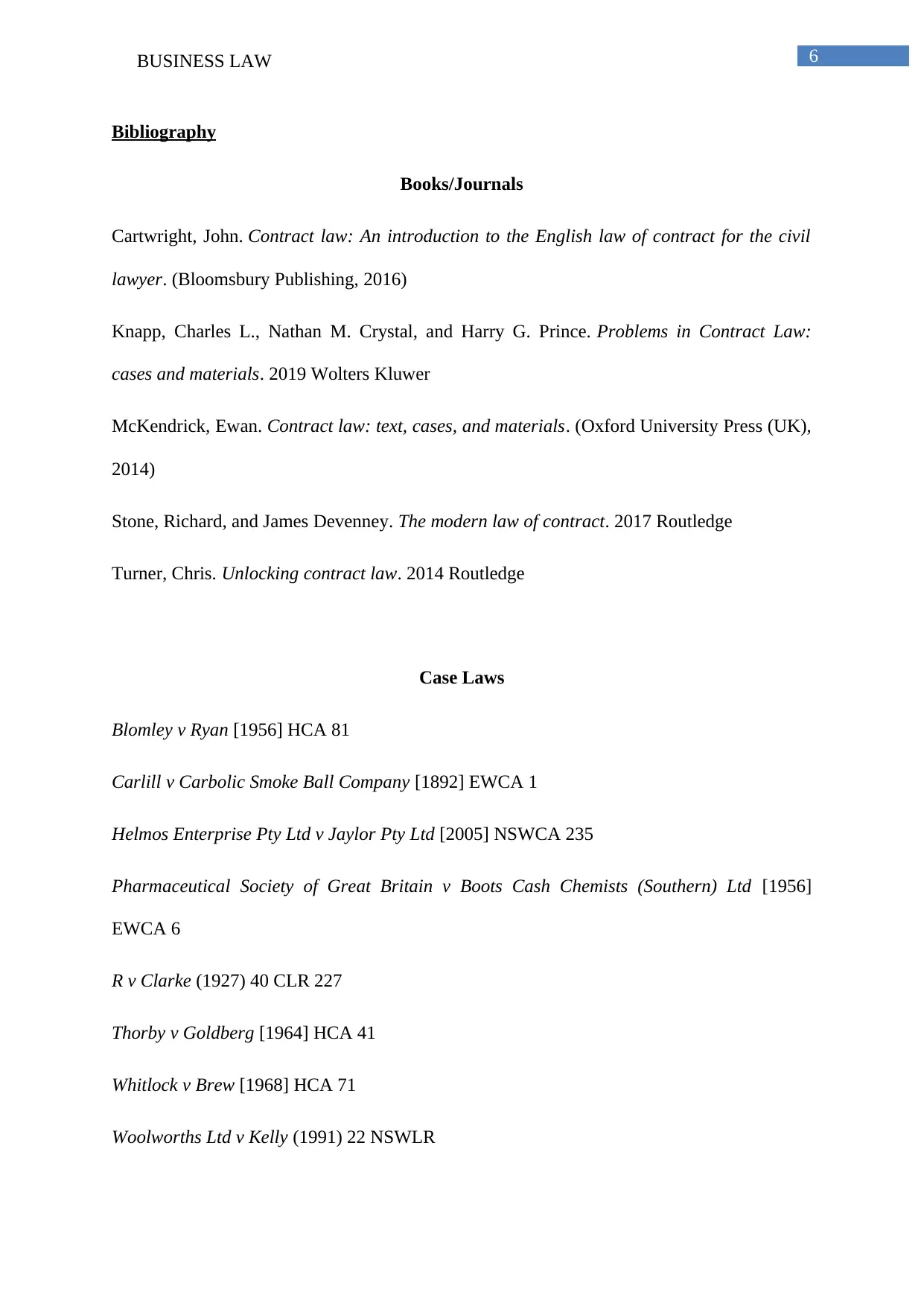
6BUSINESS LAW
Bibliography
Books/Journals
Cartwright, John. Contract law: An introduction to the English law of contract for the civil
lawyer. (Bloomsbury Publishing, 2016)
Knapp, Charles L., Nathan M. Crystal, and Harry G. Prince. Problems in Contract Law:
cases and materials. 2019 Wolters Kluwer
McKendrick, Ewan. Contract law: text, cases, and materials. (Oxford University Press (UK),
2014)
Stone, Richard, and James Devenney. The modern law of contract. 2017 Routledge
Turner, Chris. Unlocking contract law. 2014 Routledge
Case Laws
Blomley v Ryan [1956] HCA 81
Carlill v Carbolic Smoke Ball Company [1892] EWCA 1
Helmos Enterprise Pty Ltd v Jaylor Pty Ltd [2005] NSWCA 235
Pharmaceutical Society of Great Britain v Boots Cash Chemists (Southern) Ltd [1956]
EWCA 6
R v Clarke (1927) 40 CLR 227
Thorby v Goldberg [1964] HCA 41
Whitlock v Brew [1968] HCA 71
Woolworths Ltd v Kelly (1991) 22 NSWLR
Bibliography
Books/Journals
Cartwright, John. Contract law: An introduction to the English law of contract for the civil
lawyer. (Bloomsbury Publishing, 2016)
Knapp, Charles L., Nathan M. Crystal, and Harry G. Prince. Problems in Contract Law:
cases and materials. 2019 Wolters Kluwer
McKendrick, Ewan. Contract law: text, cases, and materials. (Oxford University Press (UK),
2014)
Stone, Richard, and James Devenney. The modern law of contract. 2017 Routledge
Turner, Chris. Unlocking contract law. 2014 Routledge
Case Laws
Blomley v Ryan [1956] HCA 81
Carlill v Carbolic Smoke Ball Company [1892] EWCA 1
Helmos Enterprise Pty Ltd v Jaylor Pty Ltd [2005] NSWCA 235
Pharmaceutical Society of Great Britain v Boots Cash Chemists (Southern) Ltd [1956]
EWCA 6
R v Clarke (1927) 40 CLR 227
Thorby v Goldberg [1964] HCA 41
Whitlock v Brew [1968] HCA 71
Woolworths Ltd v Kelly (1991) 22 NSWLR
Paraphrase This Document
Need a fresh take? Get an instant paraphrase of this document with our AI Paraphraser

7BUSINESS LAW
1 out of 8
Related Documents
Your All-in-One AI-Powered Toolkit for Academic Success.
+13062052269
info@desklib.com
Available 24*7 on WhatsApp / Email
![[object Object]](/_next/static/media/star-bottom.7253800d.svg)
Unlock your academic potential
Copyright © 2020–2026 A2Z Services. All Rights Reserved. Developed and managed by ZUCOL.




